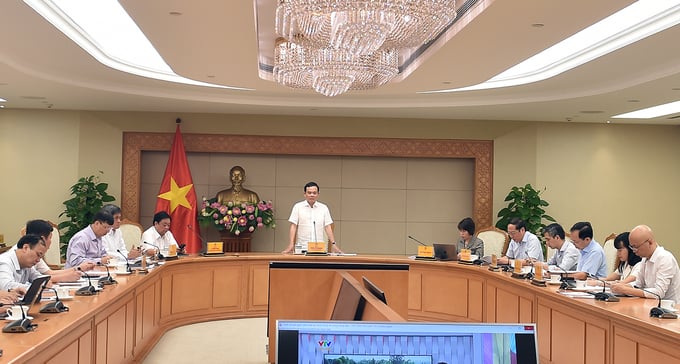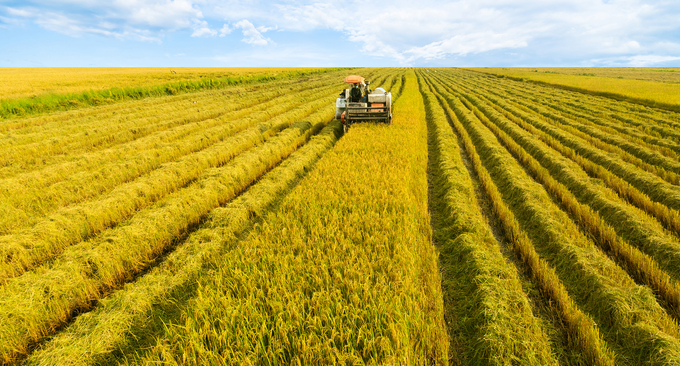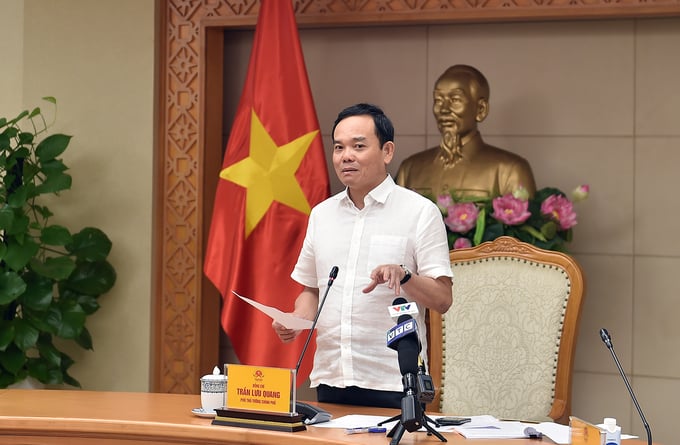May 30, 2025 | 20:22 GMT +7
May 30, 2025 | 20:22 GMT +7
Hotline: 0913.378.918
May 30, 2025 | 20:22 GMT +7
Hotline: 0913.378.918
On the morning of July 17, Deputy Prime Minister Tran Luu Quang presided over a meeting at the Government Headquarters to receive updates on the Project for Sustainable Development of 1 Million Hectares of High-Quality, Low-Emission Rice Cultivation associated with Green Growth in the Mekong Delta Region by 2030 (the Project).
According to Deputy Minister of Agriculture and Rural Development Tran Thanh Nam, the Ministry of Agriculture and Rural Development (MARD) implemented the Project by establishing a Steering Committee for the Project. The Committee was comprised of representatives from the World Bank (WB), the State Bank of Vietnam, the Ministry of Planning and Investment, Finance, Natural Resources and Environment, and leaders from 12 provinces and cities in the Mekong Delta Region.

The meeting heard a report on the progress of implementing the Project for sustainable development of 1 million hectares of high-quality, low-emission rice at the Government Headquarters on July 17. Photo: Hai Minh.
A Plan to Improve the Capacity of Agricultural Cooperatives and Partners to Establish Value Chain Linkages to Implement the Project and Technical Procedures for High-Quality, Low-Emission Rice Production in the Mekong Delta Region have been developed by the Ministry.
Seven pilot models have been implemented by the Ministry in Can Tho City, Dong Thap, Kien Giang, Tra Vinh, and Soc Trang, spanning three crops. The Ministry will compile and acknowledge the emission factors associated with rice production by the winter-spring crop of 2024-2025.
The rice cultivation model implemented by the Project during the 2024 summer-autumn crop in Can Tho City has yielded favorable outcomes, including a 10% to 15% decrease in total input costs, a 2- to 2.5-fold decrease in the number of seeds used, a 30% decrease in fertilizer consumption, and a 30-40% decrease in irrigation water consumption, as per preliminary evaluations.
The control model yielded 5.89 tons/ha, while the pilot model yielded 6.13 - 6.51 tons/ha. The pilot model generated a profit of 21 - 25.8 million VND/ha, which is 1.3 - 6.2 million VND/ha greater than the control model.
The pilot model mitigated 2 tons of CO2/ha in comparison to the control model, which eliminated straw from the field, and 12 tons of CO2/ha in comparison to the perpetually flooded control model, which incorporated straw after harvest.
It is important to note that numerous businesses have pledged to acquire all rice products manufactured under the pilot models.

Many businesses have committed to purchasing all rice products produced in pilot models. Photo: TL.
Nevertheless, the Project continues to encounter certain challenges in its implementation. Initially, Vietnam was the first country in the world to implement large-scale emission reductions in rice cultivation, and the activities and content are novel and unprecedented.
Farmers' comprehension of the Project remains restricted. The effective implementation of the Project necessitates the consensus of farmers, as some households continue to operate according to traditional methods. The minimum scale for participation in the Project is a contiguous area of 50 hectares or more, whereas rice cultivation areas are still fragmented and tiny in many provinces.
Furthermore, the number of households that are involved in the region through cooperatives, cooperative groups, and linking with enterprises is still limited, particularly in provinces that are not participating in the VnSAT initiative.
The infrastructure for the production of high-quality, low-emission rice in localities is not yet synchronized and requires additional investment in the future. The number of enterprises that have established partnerships with cooperatives and cooperative organizations to invest in and secure products remains restricted.
The Ministry of Agriculture and Rural Development (MARD) suggests that the Government propose to the National Assembly to issue a resolution to pilot specific policies on the use of ODA funds and concessional loans from foreign donors at the October 2024 session to ensure that the Project's implementation progresses on schedule and meets the established goals.
During the meeting, the leaders of numerous ministries reaffirmed their dedication to assisting MARD in the implementation of the Project in accordance with the Prime Minister's commitment to exclusively discussing forward progress, rather than setbacks.
The ministries have urgently requested that MARD calculate and clarify the funding sources for the Project, specify special policies on the use of ODA funds and concessional loans, maximize policies that support high-quality rice cultivation, and identify investment areas for high-yield, high-quality rice to serve as a foundation for the Project's implementation.

Deputy Prime Minister Tran Luu Quang highly appreciated the Ministry of Agriculture and Rural Development and localities for proactively implementing the Project, initially bringing very positive results. Photo: Hai Minh.
The Deputy Prime Minister underscored the following during the meeting's conclusion: The project introduces a novel production method that is consistent with global production and consumption trends, revolutionizes agricultural thinking in the Mekong Delta, which is currently experiencing the rapid and unpredictable effects of climate change, and enhances the income and living standards of rice farmers and businesses, thereby assisting Vietnam in achieving its objective of achieving net-zero emissions by in 2050.
The Deputy Prime Minister expressed his profound gratitude to MARD and the localities for their proactive implementation of the Project, which has yielded impressive results thus far. These results include increased productivity, reduced costs, and increased profits as a result of the application of pilot models that are based on the accomplishments of the VnSAT Project and a series of technical support projects from non-governmental organizations.
MARD is required to provide clarification on the investment items and work content of the World Bank loan project, ensuring that there is no duplication or overlap with the existing content. The investment must be allocated to sustainable development projects in the Mekong Delta that are adapting to climate change (Mekong DPO). Additionally, MARD must ensure that the project complies with the approved planning by competent authorities.
The Deputy Prime Minister emphasized the need for MARD to clearly define the tasks, responsibilities for implementation, expected products, and deadlines for completing each task and work content, recognizing that there is still much work to be done.
Translated by Linh Linh

(VAN) Several scientists and farmers are experimenting with soil treatment in some key durian-growing regions such as Cai Lay (Tien Giang), Dak Song, Gia Nghia, and Dak R’lap (Dak Nong).
/2025/05/25/4127-3-073637_820.jpg)
(VAN) Thanks to the promotion from an FAO-implemented project, vegetable production in greenhouses in Moc Chau has seen strong development, from 1.5 hectares in 2021 to nearly 50 hectares in 2024.

(VAN) FAO has recently supported USD 140,000 to implement the project 'Risk mitigation human-animal interface risks through disease control initiatives in pig farming.'

(VAN) The People's Committee of Tra Vinh province has approved an adjustment to the investment policy for the Green Hydrogen Plant project, increasing its area to approximately 52.76 hectares.
![Reducing emissions from rice fields: [2] Farmers’ commitment to the soil](https://t.ex-cdn.com/nongnghiepmoitruong.vn/608w/files/news/2025/05/05/dsc08881jpg-nongnghiep-140632.jpg)
(VAN) Clean rice cultivation model in Thuong Tan commune, Bac Tan Uyen district, is assisting local residents in achieving sustainable agriculture by substantially reducing costs, increasing productivity, and protecting the environment.

(VAN) At the conference to disseminate Resolution No. 68, AgriS introduced its digital agricultural ecosystem and reaffirmed its commitment to accompanying the Government in promoting private sector development and sustainable agriculture.

(VAN) 'Blue Ocean - Blue Foods' initiative is designed to restore marine ecosystems and establish sustainable livelihoods for local communities by cultivating a minimum of 1,000 hectares of cottonii seaweed in the first three years.